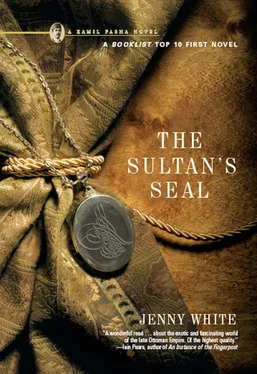Jenny White - The Sultan's seal
Здесь есть возможность читать онлайн «Jenny White - The Sultan's seal» весь текст электронной книги совершенно бесплатно (целиком полную версию без сокращений). В некоторых случаях можно слушать аудио, скачать через торрент в формате fb2 и присутствует краткое содержание. Жанр: Исторический детектив, на английском языке. Описание произведения, (предисловие) а так же отзывы посетителей доступны на портале библиотеки ЛибКат.
- Название:The Sultan's seal
- Автор:
- Жанр:
- Год:неизвестен
- ISBN:нет данных
- Рейтинг книги:5 / 5. Голосов: 1
-
Избранное:Добавить в избранное
- Отзывы:
-
Ваша оценка:
- 100
- 1
- 2
- 3
- 4
- 5
The Sultan's seal: краткое содержание, описание и аннотация
Предлагаем к чтению аннотацию, описание, краткое содержание или предисловие (зависит от того, что написал сам автор книги «The Sultan's seal»). Если вы не нашли необходимую информацию о книге — напишите в комментариях, мы постараемся отыскать её.
The Sultan's seal — читать онлайн бесплатно полную книгу (весь текст) целиком
Ниже представлен текст книги, разбитый по страницам. Система сохранения места последней прочитанной страницы, позволяет с удобством читать онлайн бесплатно книгу «The Sultan's seal», без необходимости каждый раз заново искать на чём Вы остановились. Поставьте закладку, и сможете в любой момент перейти на страницу, на которой закончили чтение.
Интервал:
Закладка:
The women wore white chemises of the softest silk, their breasts braced in low brocaded vests. Over this, they wore flowered or striped silk robes in all the colors of the garden and the jewel box: apple green, cherry red, heliotrope, peacock blue, the yellow of songbirds, pink, ruby and garnet, eau de nil. The robe was wrapped about with a silk girdle, and a bright, contrasting tunic with long, slit sleeves and trailing, divided skirts. Their hair was plaited into many braids, entwined with ropes of pearls and strings of jewels, or twisted up in colorful scarves dripping with embroidery and beaded fringes that framed their faces and swayed softly against their cheeks when they moved. They looked gay, like the colorful parrots and sweet-singing canaries some kept in fanciful cages in their courtyards. Their chirping lulled me into the languorous restfulness when nothing is expected of you and everything is given. The short bliss of childhood.
In ensuing years, the mesh of information and conjecture became tighter and caught up young girls like myself, ladies in training who were expected to be of serious mien, although pleasant and polite. Giggly girls who ran about and smiled too easily were spoiled and inevitably would come to a bad end. I tried my best not to smile out of place or too often, and I believe I succeeded all too well, given my increasing boredom at such functions.
My secluded life at Chamyeri gave me no practice in the skill of light conversation. I knew next to nothing about our family, except what news my cousin and tutor, Hamza, brought when he visited, and what Violet, who had her own mysterious sources, shared with me, much of which was unrepeatable. Nor did I know the stories of other prominent families and the characters peopling them. Our secluded lifestyle left me ignorant of changes in fashion. Mama and I were always at least a season behind. Once a year, in the fall, Mama sent for a Greek woman from Istanbul who came to the villa with samples of cloth and took orders for new clothing. But by the following summer, these were again outdated.
The fact that our household did not include live-in servants caused great consternation among the other women. Every household had to have servants, they chided my mother. It was a necessary sign of social stature, the more the better. Some middle-class homes had dozens of slaves and servants, society households many more. It was a duty to support as many poorer people as possible, a pious act that brings sevap, Allah’s reward. Besides, they asked my mother, how did she manage at night? It was unimaginable that she would make her own tea and undress herself. They would look at me and say to my mother, “A young girl needs to know how to run a household.” I never knew how Mama felt about the lack of servants. Papa’s house at Nishantashou had many servants, but Mama never complained about Ismail Dayi’s odd aversion to them. After Violet came, she helped Mama and me in the evenings after the servants had left. For my part, I did not even know how to make tea.
I did, however, know quite a bit about literature and international politics, thanks to afternoons under my cousin Hamza’s tutelage, and about Islamic jurisprudence and Persian poetry learned on long winter evenings in Ismail Dayi’s study. I could recite the Quran and, moreover, knew enough Arabic to understand it. I also knew the tides of the Bosphorus and how to move through water. I did not know fine needlework or how to embroider linens and prayer mats for my trousseau. I did not know how people died, but I was to learn that soon enough.
I much preferred spring with its blossoming cherry trees and chilly squalls of rain and the marmalade colors of autumn when the summer houses stood empty, and I began again my love affair with water. A year older, Violet knew more of the world, and I was her willing pupil. On warm days, she spread a carpet along the mossy edge of the pond. When we tired of swimming, we stretched out in our shifts and unpacked the basket she brought along. With her knife she disrobed red peaches flush as babies’ cheeks. When their juices flowed across my wrists, Violet bent over and licked them clean. She wedged open black mussels and taught me to suck their brine and take the pearl of flesh between my teeth. In the season of artichokes, we took turns plucking the leathery outer leaves one by one. Then, with her sharp knife, she cut the inner leaves down to the heart, exposing the fur, which she scraped until the choke was smooth and bare. She handed me a lemon and a twist of salt to rub into the flesh of the chokes. It stung my hands, but I did as she asked. With her thin fingers, she took the chokes from my slippery palms and immersed them in water infused with lemon, heating it slowly to a boil on a portable charcoal stove. When it was done, she fed me morsels of the delicate, fragrant flesh.
Violet did not accompany us on the summer trips; she was not of our class and would have had to stay in the servant quarters, something my mother found unacceptable, since she was, after all, a blood relative. I envied Violet the privacy of our house in summer. I imagined her slipping through the black pond like an eel, while I rested, a stone in a kaleidoscope, in the colorful rooms of the summer families. Violet, I was sure, delighted in her freedom and gave no thought to me, confined in a gilded cage like the nervous songbirds. My boredom was tinged with jealousy.
Until Violet, I had no real friends except Hamza, who accompanied my father during his weekly visits. When my father stopped coming to Chamyeri as often, Hamza still rode up from Nishantashou regularly and brought me books. He would tutor me in the garden pavilion, going over my lessons for the week, then sit for a while with my mother. He spent the night in the men’s reception room, and left after breakfast the following day. As a child, I moved freely through the house and crept at night under Hamza’s quilt for an hour or so. Holding me in the crook of his arm, he read to me from books he had hidden in his satchel, colorful tales of Frankish fairies and Arab djinns, French love poems and fantastic stories quite different from the earnest literature we read and discussed by day. When his eyes began to close, he put his hand below my chin and turned my face to him. He kissed my forehead and whispered, in French,
“Who is your prince?”
“You are, dear Hamza.”
“Am I your only prince?”
“Of course, my only one.”
“Forever?”
“Forever.”
His breath was hot on my ear.
“Sleep now, princess. Dream of your prince.”
It was our secret signal that I should return to my room. I disentangled myself from his arms regretfully. He did not tell me to walk softly and make certain no one saw. Somehow I knew that this cherished ritual would vanish if exposed to the gaze of others.
My uncle was my other tutor. On evenings when he did not have company, Ismail Dayi was happy to discuss what I had read and guide me to other readings he considered appropriate for my age. During the cold months, dressed in quilted robes, we put cushions on the thick wool carpet and tucked our legs under an enormous cotton-filled comforter that had been stretched over a box-like brazier to trap the heat. My eccentric dayi had no sense, of course, of what was considered appropriate for a girl, so he trained me as he would a young apprentice, a relationship both familiar and comfortable to him. Snug under our comforter, we sat opposite each other, read Ottoman jurisprudence, and took turns reciting mystical poetry.
One who sees my aimless turning might take me for the desert whirlwind
I am nothing within nothing, if I have any being, it comes from you.
While I was your rolling pearl, why did you let me go astray?
If my dust is on the mirror of life, it comes from you.
Читать дальшеИнтервал:
Закладка:
Похожие книги на «The Sultan's seal»
Представляем Вашему вниманию похожие книги на «The Sultan's seal» списком для выбора. Мы отобрали схожую по названию и смыслу литературу в надежде предоставить читателям больше вариантов отыскать новые, интересные, ещё непрочитанные произведения.
Обсуждение, отзывы о книге «The Sultan's seal» и просто собственные мнения читателей. Оставьте ваши комментарии, напишите, что Вы думаете о произведении, его смысле или главных героях. Укажите что конкретно понравилось, а что нет, и почему Вы так считаете.












